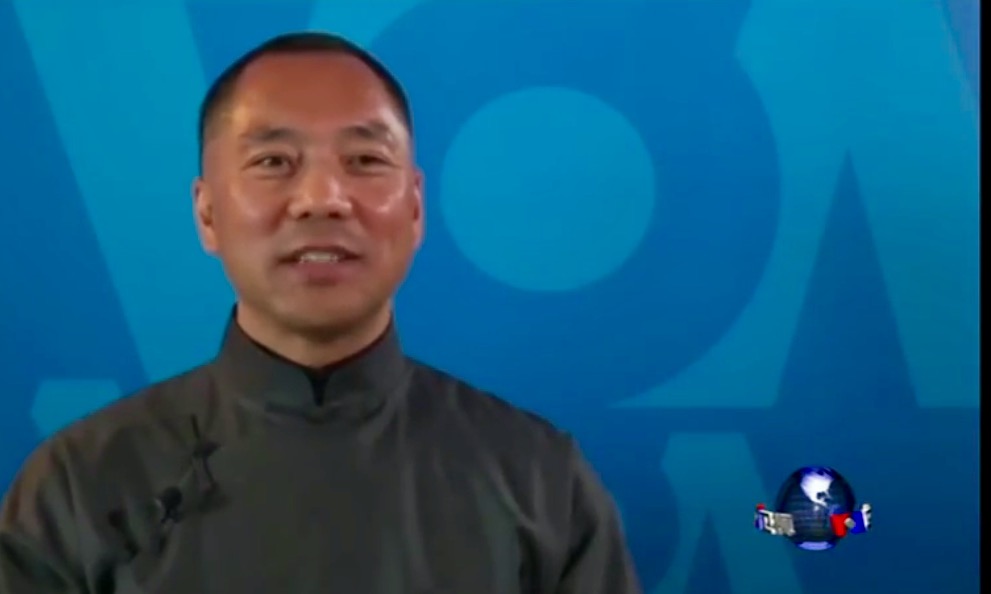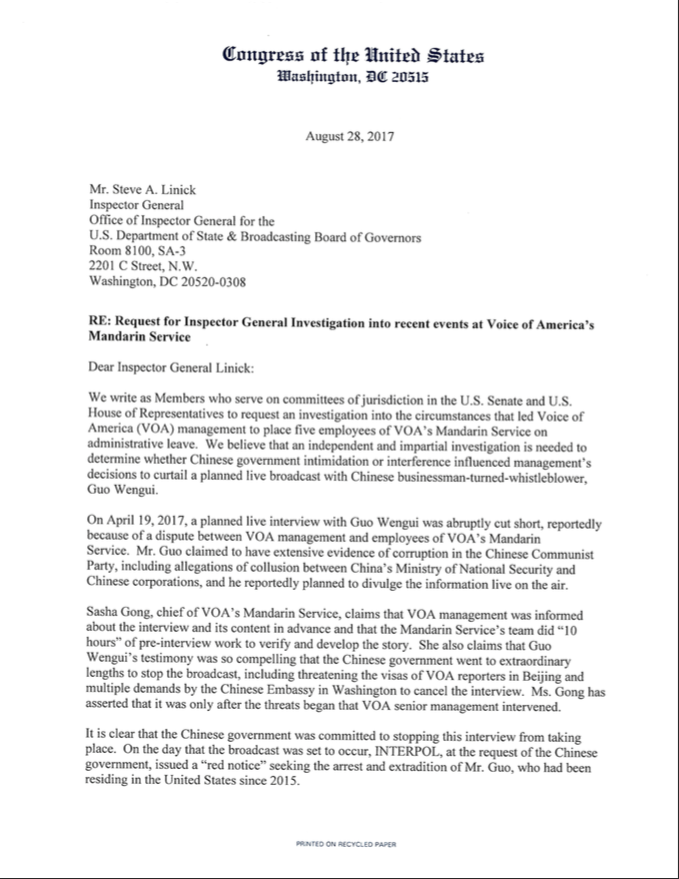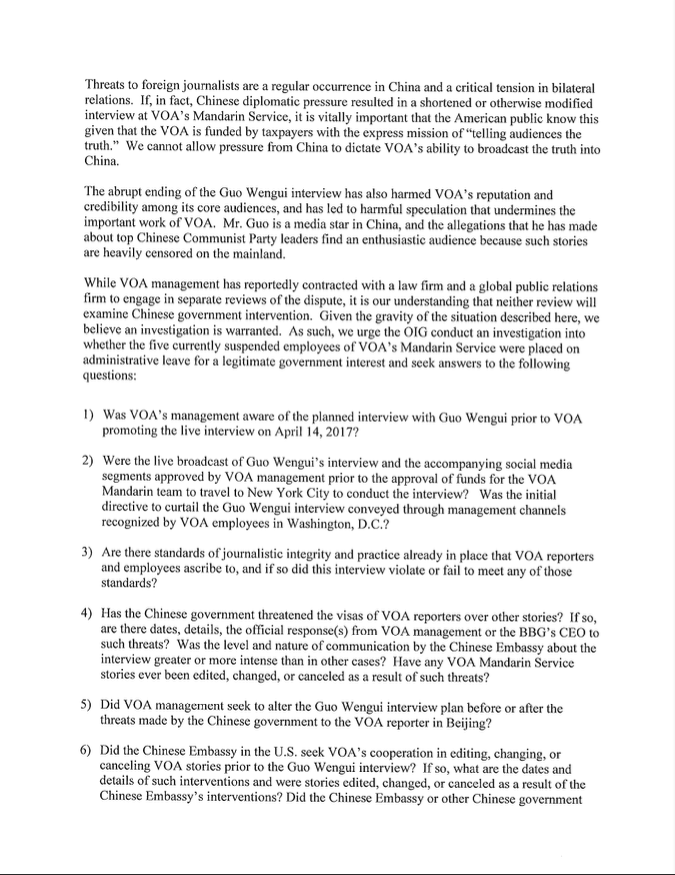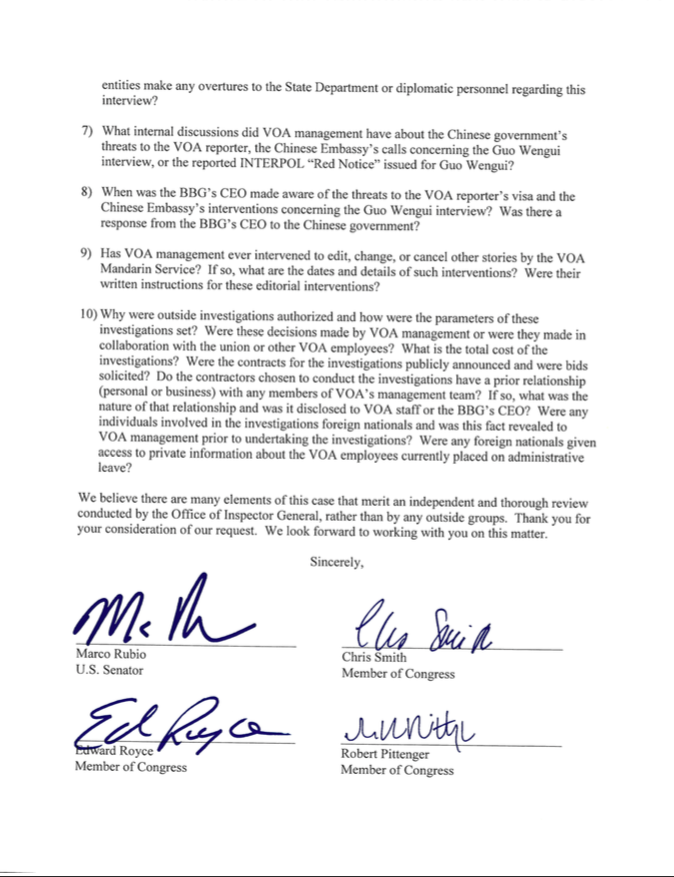BBG Watch Commentary EXCLUSIVE
Four members of the U.S. Congress who serve on committees in the U.S. Senate and U.S. House of Representatives which oversee the operations of the Broadcasting Board of Governors (BBG) and the Voice of America (VOA) have submitted a written request to Inspector General Steve A. Linick in the Office of Inspector General (OIG) for the U.S. Department of State & Broadcasting Board of Governors to conduct an investigation into the circumstances that led Voice of America management to place five employees of VOA’s Mandarin Service on administrative leave after the senior VOA managers abruptly ordered them to shorten a live broadcast with Chinese businessman-turned-whistleblower, Guo Wengui, on April 19, 2017.
“If, in fact, Chinese diplomatic pressure resulted in a shortened or otherwise modified interview at VOA’s Mandarin Service, it is vitally important that the American public know this given that the VOA is funded by taxpayers with the express mission of ‘telling audiences the truth’,” the members of Congress wrote to the Inspector General.
VOA director Amanda Bennett had denied that pressure from the Chinese government played any role in her decision to order the live Guo Wengui interview to be shortened. Bennett, who reports to BBG CEO John F. Lansing, insists that she was trying to uphold universally accepted journalistic practices.
In requesting an OIG investigation, Senator Marco Rubio, Rep. Edward Royce, Rep. Chris Smith and Rep. Robert Pittenger wrote: “We cannot allow pressure from China to dictate VOA’s ability to broadcast the truth into China.”
U.S. lawmakers noted allegations that shortly before the live interview with Guo Wengui was to be broadcast by the VOA Mandarin Service, “the Chinese government went to extraordinary lengths to stop the broadcast, including threatening the visas of VOA reporters in Beijing and multiple demands by the Chinese Embassy in Washington to cancel the interview.”
The letter, dated August 28, 2017, was signed by a member of Senate Committees on Appropriations, Foreign Relations and Select Committee on Intelligence U.S. Senator Marco Rubio (R-FL); Chairman of the House Foreign Affairs Committee Rep. Edward Royce (R-CA); a senior member on the Foreign Affairs Committee and Co-Chairman and the highest-ranking House member of both the bipartisan House/Senate Commission on Security and Cooperation in Europe (CSCE), and the bipartisan House/Senate/White House Congressional-Executive Commission on China Rep. Chris Smith (R-NJ); and Commissioner of the Congressional-Executive Commission on China and Vice-Chairman of Terrorism and Illicit Finance Subcommittee Robert Pittenger (R-NC).
###
Congress of the United States
Washington, DC 20515
August 28, 2017
Mr. Steve A. Linick
Inspector General
Office of Inspector General for the U.S. Department of State & Broadcasting Board of Governors
Room 8100, SA-3
2201 C Street, N.W.
Washington, DC 20520-0308
RE: Request for Inspector General Investigation into recent events at Voice of America’s Mandarin Service
Dear Inspector General Linick:
We write as Members who serve on committees of jurisdiction in the U.S. Senate and U.S. House of Representatives to request an investigation into the circumstances that led Voice of America (VOA) management to place five employees of VOA’s Mandarin Service on administrative leave. We believe that an independent and impartial investigation is needed to determine whether Chinese government intimidation or interference influenced management’s decisions to curtail a planned live broadcast with Chinese businessman-turned-whistleblower, Guo Wengui.
On April 19, 2017, a planned live interview with Guo Wengui was abruptly cut short, reportedly because of a dispute between VOA management and employees of VOA’s Mandarin Service. Mr. Guo claimed to have extensive evidence of corruption in the Chinese Communist Party, including allegations of collusion between China’s Ministry of National Security and Chinese corporations, and he reportedly planned to divulge the information live on the air.
Sasha Gong, chief of VOA’s Mandarin Service, claims that VOA management was informed about the interview and its content in advance and that the Mandarin Service’s team did “10 hours” of pre-interview work to verify and develop the story. She also claims that Guo Wengui’s testimony was so compelling that the Chinese government went to extraordinary lengths to stop the broadcast, including threatening the visas of VOA reporters in Beijing and multiple demands by the Chinese Embassy in Washington to cancel the interview. Ms. Gong has asserted that it was only after the threats began that VOA senior management intervened.
It is clear that the Chinese government was committed to stopping this interview from taking place. On the day that the broadcast was set to occur, INTERPOL, at the request of the Chinese government, issued a “red notice” seeking the arrest and extradition of Mr. Guo, who had been residing in the United States since 2015.
Threats to foreign journalists are a regular occurrence in China and a critical tension in bilateral relations. If, in fact, Chinese diplomatic pressure resulted in a shortened or otherwise modified interview at VOA’s Mandarin Service, it is vitally important that the American public know this given that the VOA is funded by taxpayers with the express mission of “telling audiences the truth.” We cannot allow pressure from China to dictate VOA’s ability to broadcast the truth into China.
The abrupt ending of the Guo Wengui interview has also harmed VOA’s reputation and credibility among its core audiences, and has led to harmful speculation that undermines the important work of VOA. Mr. Guo is a media star in China, and the allegations that he has made about top Chinese Communist Party leaders find an enthusiastic audience because such stories are heavily censored on the mainland.
While VOA management has reportedly contracted with a law firm and a global public relations firm to engage in separate reviews of the dispute, it is our understanding that neither review will examine Chinese government intervention. Given the gravity of the situation described here, we believe an investigation is warranted. As such, we urge the OIG conduct an investigation into whether the five currently suspended employees of VOA’s Mandarin Service were placed on administrative leave for a legitimate government interest and seek answers to the following questions:
1) Was VOA’s management aware of the planned interview with Guo Wengui prior to VOA promoting the live interview on April 14, 2017?
2) Were the live broadcast of Guo Wengui’s interview and the accompanying social media segments approved by VOA management prior to the approval of funds for the VOA Mandarin team to travel to New York City to conduct the interview? Was the initial directive to curtail the Guo Wengui interview conveyed through management channels recognized by VOA employees in Washington, D.C.?
3) Are there standards of journalistic integrity and practice already in place that VOA reporters and employees ascribe to, and if so did this interview violate or fail to meet any of those standards?
4) Has the Chinese government threatened the visas of VOA reporters over other stories? If so, are there dates, details, the official response(s) from VOA management or the BBG’s CEO to such threats? Was the level and nature of communication by the Chinese Embassy about the interview greater or more intense than in other cases? Have any VOA Mandarin Service stories ever been edited, changed, or canceled as a result of such threats?
5) Did VOA management seek to alter the Guo Wengui interview plan before or after the threats made by the Chinese government to the VOA reporter in Beijing?
6) Did the Chinese Embassy in the U.S. seek VOA’s cooperation in editing, changing, or canceling VOA stories prior to the Guo Wengui interview? If so, what are the dates and details of such interventions and were stories edited, changed, or canceled as a result of the Chinese Embassy’s interventions? Did the Chinese Embassy or other Chinese government entities make any overtures to the State Department or diplomatic personnel regarding this interview?
7) What internal discussions did VOA management have about the Chinese government’s threats to the VOA reporter, the Chinese Embassy’s calls concerning the Guo Wengui interview, or the reported INTERPOL “Red Notice” issued for Guo Wengui?
8) When was the BBG’s CEO made aware of the threats to the VOA reporter’s visa and the Chinese Embassy’s interventions concerning the Guo Wengui interview? Was there a response from the BBG’s CEO to the Chinese government?
9) Has VOA management ever intervened to edit, change, or cancel other stories by the VOA Mandarin Service? If so, what are the dates and details of such interventions? Were their written instructions for these editorial interventions?
10) Why were outside investigations authorized and how were the parameters of these investigations set? Were these decisions made by VOA management or were they made in collaboration with the union or other VOA employees? What is the total cost of the investigations? Were the contracts for the investigations publicly announced and were bids solicited? Do the contractors chosen to conduct the investigations have a prior relationship (personal or business) with any members of VOA’s management team? If so, what was the nature of that relationship and was it disclosed to VOA staff or the BBG’s CEO? Were any individuals involved in the investigations foreign nationals and was this fact revealed to VOA management prior to undertaking the investigations? Were any foreign nationals given access to private information about the VOA employees currently placed on administrative leave?
We believe there are many elements of this case that merit an independent and thorough review conducted by the Office of Inspector General, rather than by any outside groups. Thank you for your consideration of our request.
We look forward to working with you on this matter.
Marco Rubio
U.S. Senator
Edward Royce
Member of Congress
Chris Smith
Member of Congress
Robert Pittenger
Member of Congress
###




4 comments
What also should be investigated are VOA Director’s family business connections with China, and any role these may have played in the decision to cut short the Guo Wengui interview.
Also — should probe exactly who was hired, and how much was swpent,
as investigators, and demand transcripts of the investigation sessions
held in the BBG building.
The interruption on VOA interview of Mr. Guo was very surprising because VOA had been considered as a reliable information source for truth. VOA’s image was unavoidably damaged by this event.
Members need to continue to the hudson Institute to suspend Mr. Guo speech to investigate
Comments are closed.